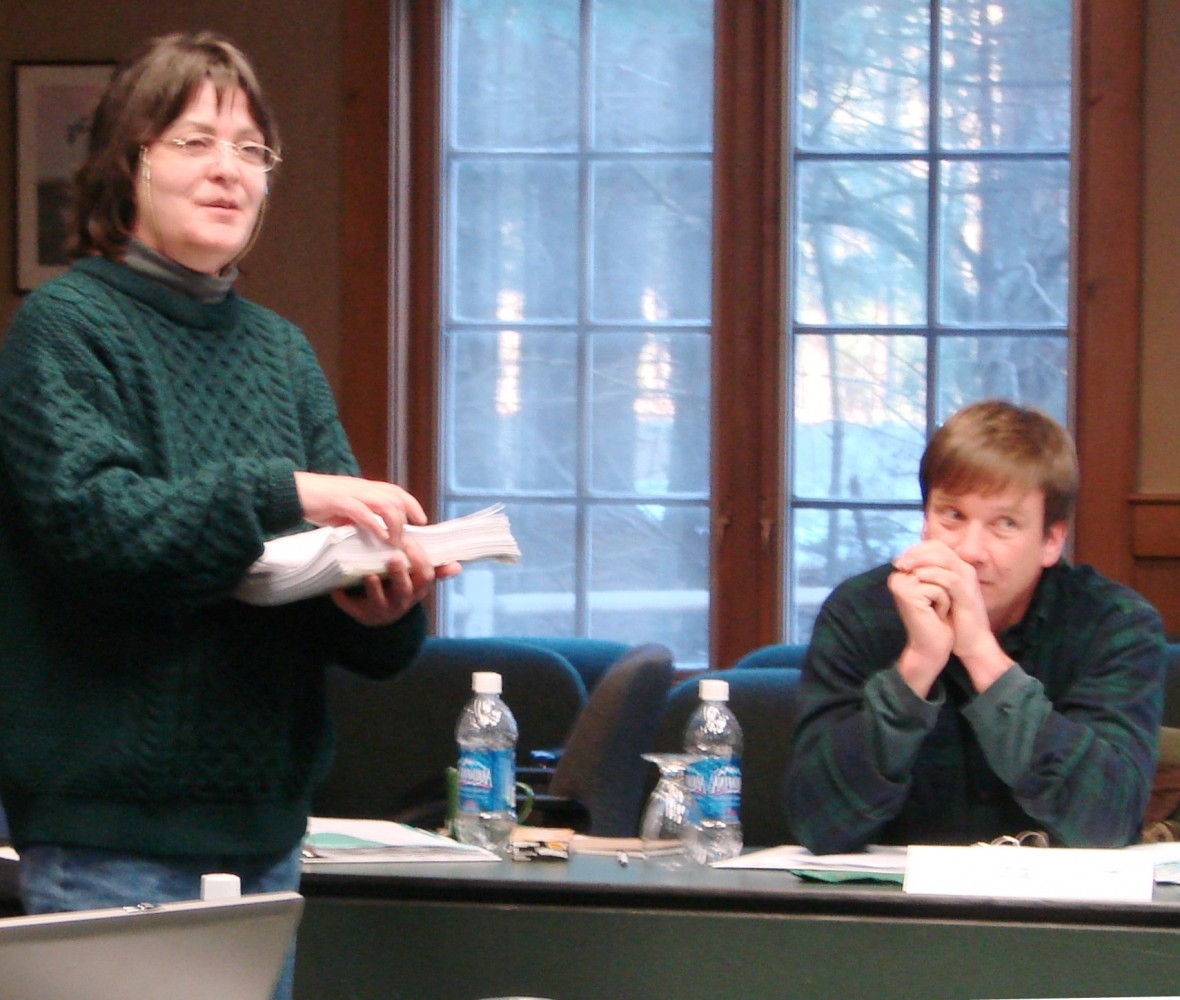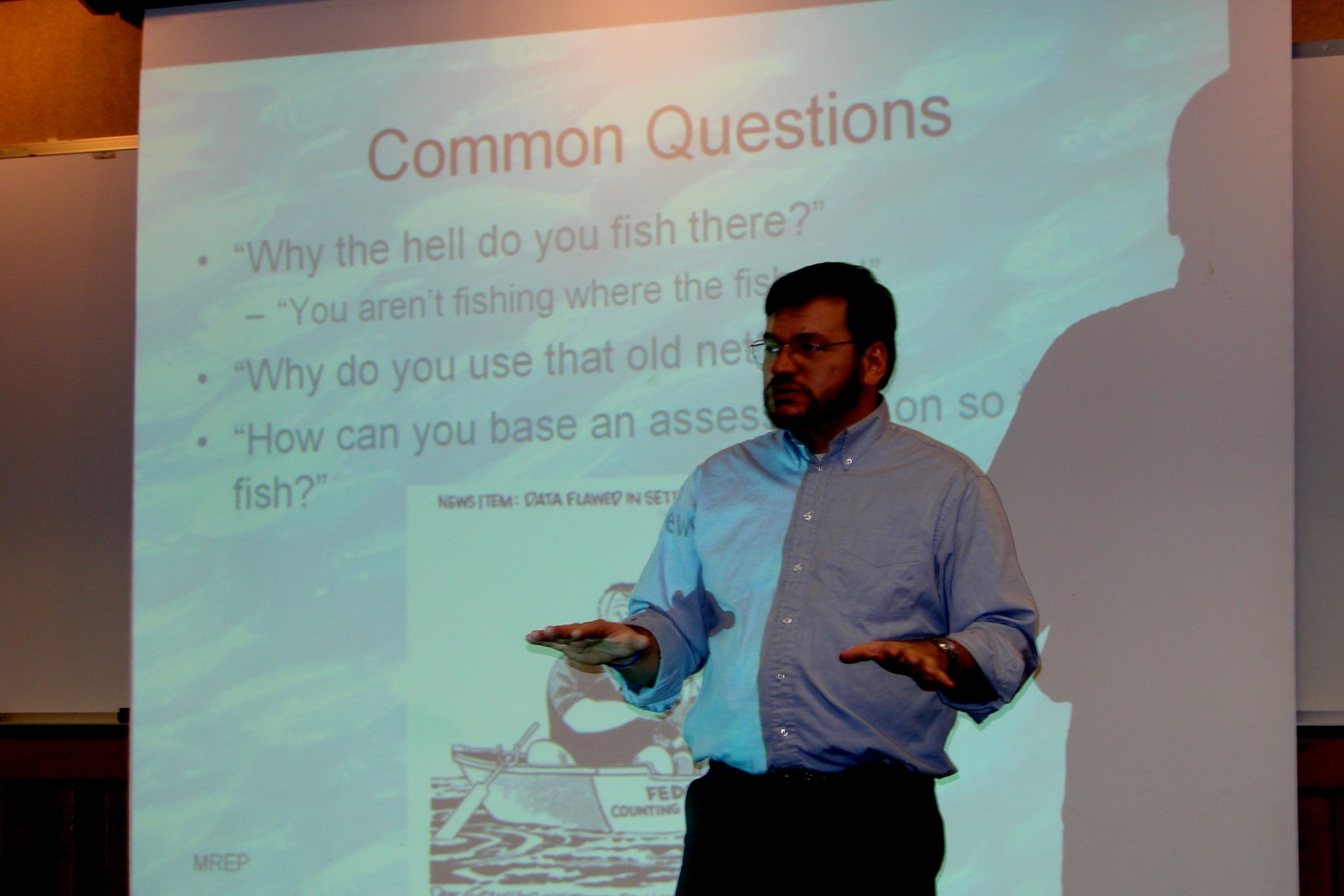“I have always said that we need fisheries management that we can all understand. How can fishermen follow management or regulations if they don’t understand them?
“I believe that for us to have a healthy fishery we need for fishermen, managers, environmentalists, and marine biologists all to come together and try to resolve fishery management problems. Fishermen are trained to catch fish. Biologists, managers, and environmentalists are trained to save fish. There is the problem. We all need some type of education on how to work for the same goals in fishery management.
“I have been involved in fishery management of one sort or another for the last 25 years. When I first started attending fisheries management meetings I was under the illusion that all the management process needed was to listen to the fishermen’s side of what was happening and they would understand and correct what was really going on. What a surprise I got. It was like getting slapped in the face with a breaking sea in the middle of February.
“I would like to see us all come together and learn from one-another so we will not be constantly in the dilemma. Since the early 1960’s we have been arguing about who the fish belong to, rather than how we maintain a healthy fishery for our future generations.
“I foresee this as an ongoing training mechanism to educate current and future fishermen, biologists, managers, and environmentalists. I also believe that a certificate program be part of this project because it shows that someone has bought into the concept, and also shows pride.”
-Rodney Avila, vessel owner New Bedford, MA
“[The] Marine Resource Education Program (MREP) is building needed awareness among stakeholders. Many expressed the need for continuous stakeholder education and investment in MREP…. an outreach program that is truly working. We have not heard a single negative comment about MREP during the course of 179 interviews with Northeast industry and other stakeholders.”
-Review of the New England Fishery Management Process authored by Preston Pate and the Touchstone Group, Inc., 2010
“I heard about MREP and jumped at the chance. The Fishery Management Process module presented the material in layman’s terms, making it much less confusing and intimidating. I left with more confidence that this can be a system with room for people.”
-Deb Schrader, Shore Support, New Bedford, MA
“The goal of the Marine Resource Education Program should be empowering fishermen through knowledge of the management process and scientific assessments. A huge overall perception in the fishing community is that their opinions do not matter, and when they do go to meetings and express them nothing happens. If we could show a path that can lead to effective participation and making a difference, participants would complete the session with useful tools.
“The frustrations I hear about management from members of the fishing industry include:
· The inability to act in a timely manner;
· Lack of understanding by managers of fishing activity and experience;
· Sense of clash between science and fishermen’s knowledge;
· Inability to understand acronyms (a glossary should be provided at the door!);
· Process, process, process! How is it supposed to work? Many fishermen do not understand the complexities; and
· Political reality. The posturing to the detriment of overall fisheries.
“The challenge for this project is to create effective group learning among participants: fishermen, scientists, and managers. There is a need to have fisherman on board as equal partners in scientific assessment, data collection, and management solutions. Enduring connections among participants will be enhanced if we can impart knowledge of the language and process. As someone whose knowledge of fisheries management has been acquired by “wading through it,” I am excited by an opportunity to participate and learn from this endeavor.
“There are enough subjects to encompass the length of the program. The challenge will be to assemble those individuals who will benefit the most from the project. They should represent a cross-section of industry, not a group that is species or area specific. As a director of this program I expect the individual group training sessions to report out in some fashion and demonstrate results.”
-Mary Beth Tooley, MREP Principal, O’Hara Fisheries, Camden, ME
“I came to the program [with] no comprehension of how science was used to manage fisheries, or how the management process works. My participation in the MREP has provided me with a detailed understanding of [both]. I have made an effort to explain to my friends in the recreational fishery the information…. extremely well done.”
-Greg Hurley, VA recreational angler, Bluefish Advisor
“The power of MREP is that it doesn’t teach you what to think; it empowers you to apply your thoughts to change, or develop, the existing management system.”
-Ted Platz, fisherman Point Judith, RI
“I am constantly called upon to translate what people in one group are saying into language that the other group understands.
“I see this Marine Resource Education course as a chance to bring people together in a small group to exchange knowledge without the pressure of a real resource allocation debate. There should be nothing to keep people from exploring each other’s views. Too many fishermen do not understand scientific procedure and many people in management do not understand the fine scale aspects of fishing.
“My hope for this course is that we find dynamic presenters who speak the other guy’s language. That it will produce graduates who are better able to promote responsible fishing practice. And that the course will help elevate the level of debate on marine resource issues.”
-David Goethel, F/V Ellen Diane, Hampton, NH
“This project tees up the problem of scientists and fishermen not being able to communicate. Managers and scientists need training and peaceful interaction as much as industry.
“You cannot develop a leader from scratch. We have to create incentives to attract those that already have demonstrated an aptitude for leadership. Managing a successful fish harvesting operation (running a boat) demonstrates ability to lead but requires very different skills than a successful interaction with a bureaucratic entity. Young scientists or recently graduated degrees in the marine fields should have their early encounters with the best group of industry that we can muster.
“I would look toward credit certification for a well-structured course that would repeat itself. Leaders develop leadership skills over lifetimes. We want to attract these people from industry early in their careers.
“Attendance should be required of council members sometime during the program, as some of them need the training as well. We should also encourage council staff to attend.”
-Bob Tetrault, F/V Tara Lynn and F/V Robert Michael, Portland, ME
[MREP formed relationships which] “provide a foundation that continually supports the ongoing interactions between NOAA and the industry during the fisheries management process” and that “according to those with whom we spoke, these relationships help break down barriers and eliminate preconceptions that each party has of the other…”
-Inspector General, Department of Commerce, report to Senators Kennedy and Snowe, 2009

